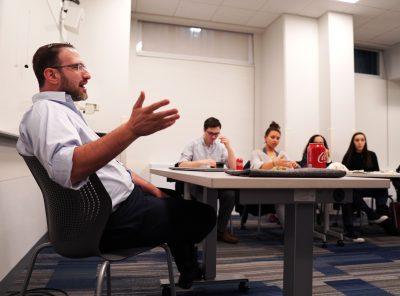
Jerusalem-based freelance journalist Sam Sokol said he has faced yelling neighbors, exclusions from societal functions and even threats to him and his family while working as a reporter. Despite such backlash, he said he remains dedicated to continuing to share true stories regardless of whom he upsets.
Tuesday night, Sokol sat down in a classroom in the College of Arts and Sciences to share his stories with Boston University students in a talk hosted by the BU Students for Israel club.
Michael Meagher, a BUSI club member and senior student in the College of Arts and Sciences, said the club wanted to host Sokol because they felt his message would be important for students to hear.
“I thought Sam would be a good person to bring to campus because of how he talks about anti-media rhetoric in the Trump era, truth and accuracy in reporting, and also because of his coverage in Israel,” Meagher said.
Sokol was originally brought to the United States for a speaking tour by Boston-based philanthropic organization Combined Jewish Philanthropies, according to Meagher. He said CJP employee David Leviev then recommended Sokol as a guest speaker for a BUSI event.
Sokol began the evening by cracking a joke as he pointed out how heavily advertised the free food was in the promotion of the talk. The discussion flowed from there, highlighting Sokol’s career, individual stories he had covered or encountered, the future of journalism and the importance of media literacy.
He shared that he works primarily for the Jewish Telegraphic Agency, a global source of Jewish journalism. Through the JTA, Sokol has been published in the Haaretz, the Times of Israel, the Forward, the Jewish Chronicle and the Columbia Journalism Review.
Rather than monopolizing the direction of the talk, Sokol opened it up, answering questions from attendees. As he engaged with the audience, Sokol delved into his coverage of, for example, growing tensions between different sects of Judaism in the Israeli city of Beit Shemesh.
“If everybody on all sides is upset with you, you’re probably doing your job,” Sokol said in an interview before the talk.
Sokol said the anti-media wave that has swept through the United States, bolstered by the Trump Administration, has spilled over into Israel. He recalled seeing billboards put up by Israeli Prime Minister Benjamin Netanyahu framing journalists as scapegoats and the enemy.
“This has made it a lot harder covering the news there, but this is still one of those professions that no matter how bad it gets, it’s like a constant high because you never know what you’re going to cover,” Sokol said. “You’re always going to end up covering something fun, or weird or something where you get a real adrenaline rush.”
Transitioning from his discussion of the growing trend of distrust in the media, Sokol went on to share more of his stories and experiences from his career. He recounted a riot that took place a few blocks from his house. Sokol said he was taking pictures of the violence when he was shot in the back with a water cannon by police.
When reporting on controversial topics, Sokol cautioned that journalists must be careful not to include any bias.
“Bias undermines your credibility,” Sokol said. “You have to pull your own emotions out of it, otherwise you can’t do the job.”
According to Sokol, minimizing bias helps to dehumanize the subjects of whatever incident is being reported on. If the subjects have no humanity, he said the writer can leave their own emotions out of their writing.
However, Sokol argued this lack of emotional transparency takes a toll. He recalled weeks of nightmares after talking to a Ukrainian refugee who told him about watching a woman’s arm get blown off as they were running for cover from rockets.
Despite the difficulties, Sokol said this profession is like no other.
“This job is like a bad habit that I just can’t break,” Sokol said. “It’s addicting. Not just from doing something exciting, but it’s the thrill of, ‘I’m exposing something, I’m getting truth to people.’ It’s fun, it’s exciting, but it’s also this sense of meaning.”
After the talk, Ben Atlas, the president of BUSI, said he felt Sokol’s visit was impactful to everyone who came.
“I think that having guest speakers is very impactful,” Atlas said. “A student informing other students about a specific topic is one thing, but a speaker who is in the field informing students about the topic means so much more. Listening to, and not just hearing, someone else’s experiences always sticks with me.”























































































































